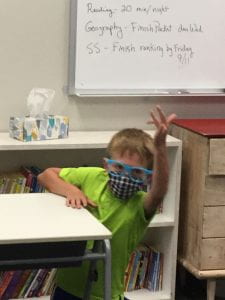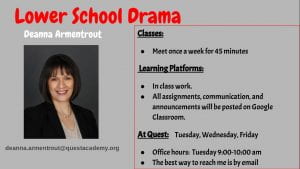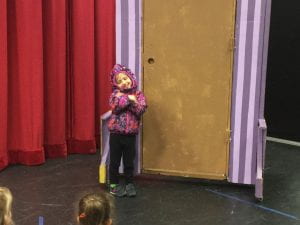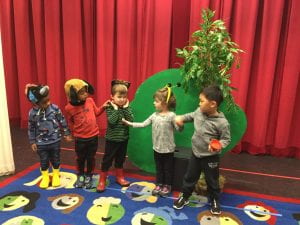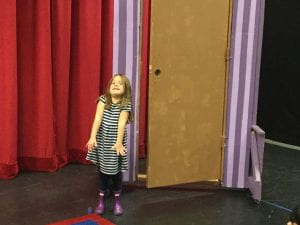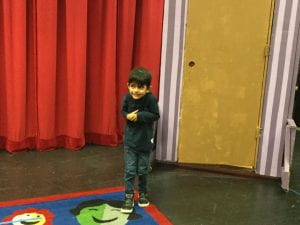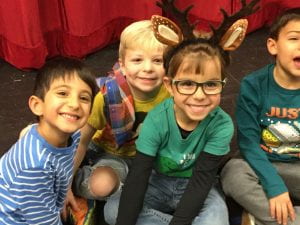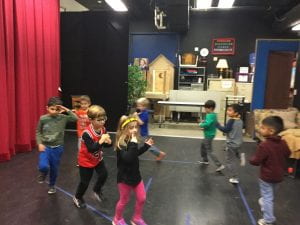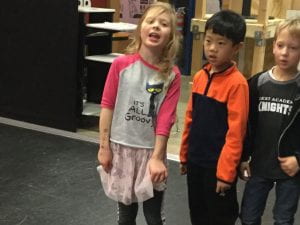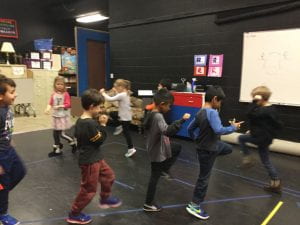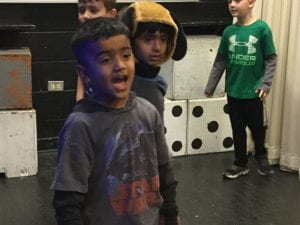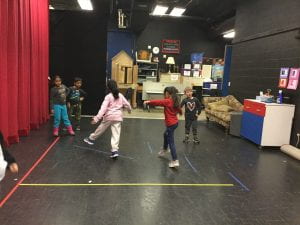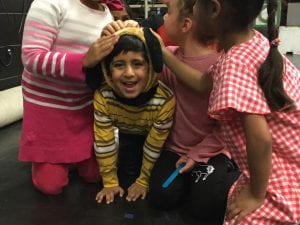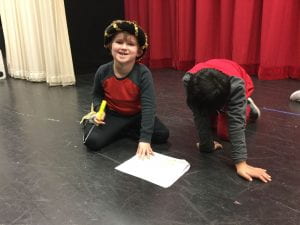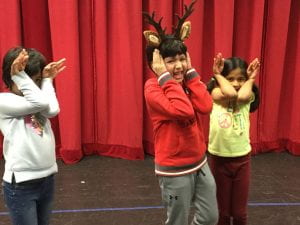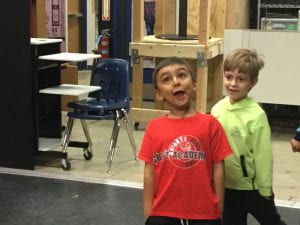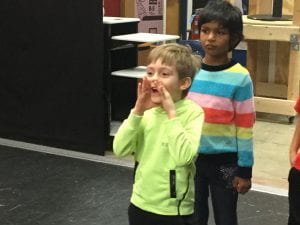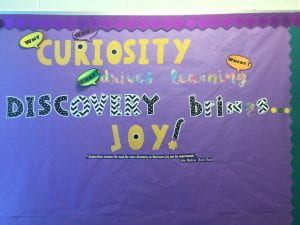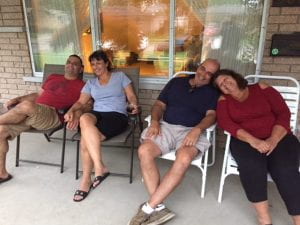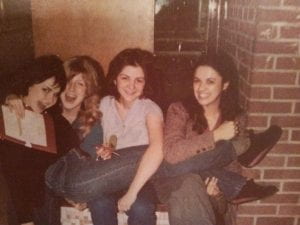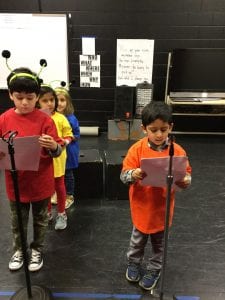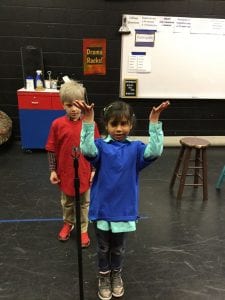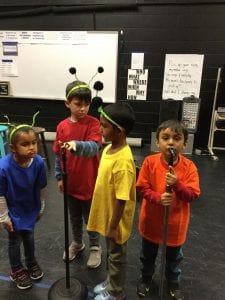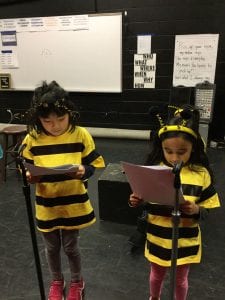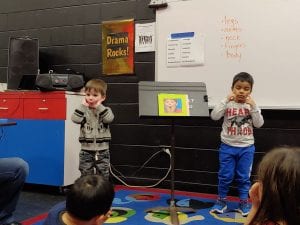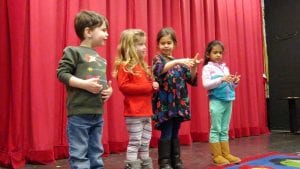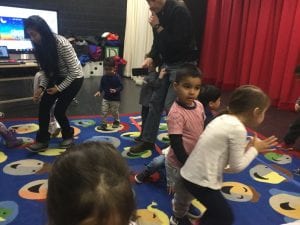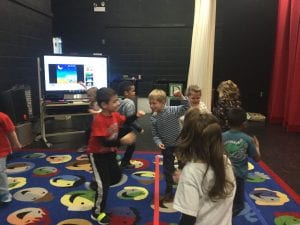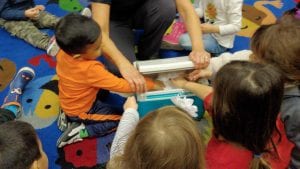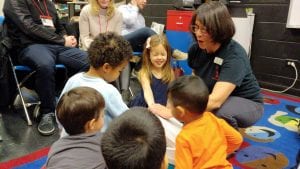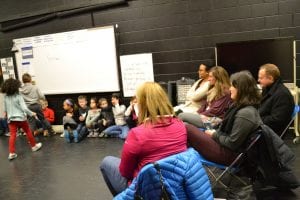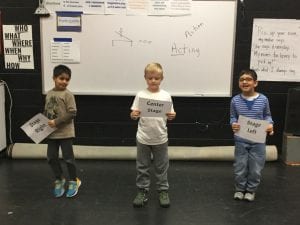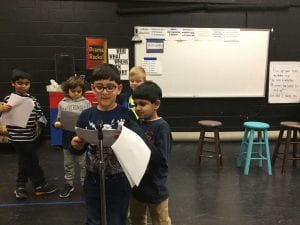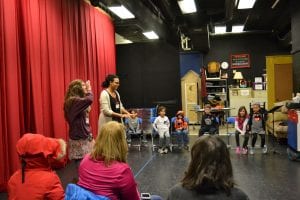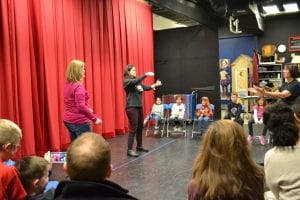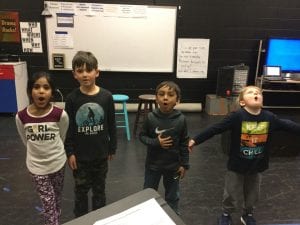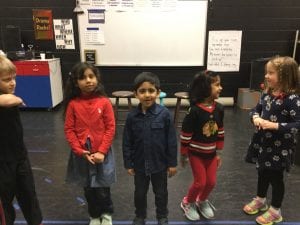Focusing our ENERGY to work together
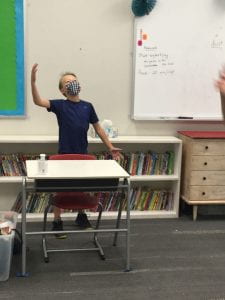 The word “drama” comes from the Greek word – “Dran” meaning… To do. In order “to do” drama, the actor must develop the basic tools:
The word “drama” comes from the Greek word – “Dran” meaning… To do. In order “to do” drama, the actor must develop the basic tools:
The body
The voice
The mind
As each new year begins, the students need to recalibrate. We review and recharge our body and brains to get in-sync with the wor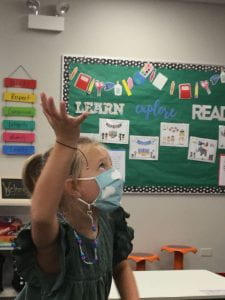 k ahead. It’s important for the students to feel freedom in the classroom to share ideas, emotions and thoughts. We work to build a safe environment that encourages risk-taking and collaboration. The exercises we have been practicing help to focus our energy, develop physical control, stimulate creative thought and challenge us to work as a group. All these exercise will support our study of the Greek Theatre, which has inspired so much of what we do in the theatre today.
k ahead. It’s important for the students to feel freedom in the classroom to share ideas, emotions and thoughts. We work to build a safe environment that encourages risk-taking and collaboration. The exercises we have been practicing help to focus our energy, develop physical control, stimulate creative thought and challenge us to work as a group. All these exercise will support our study of the Greek Theatre, which has inspired so much of what we do in the theatre today.
Two Truths and a Lie
We did our own version of Energy Circle – Energy Circle
Give and take is an important concept in acting. An actor knows when to give focus to another actor and when to take focus. If an actor is speaking, all eyes and ears should be on her. When it is time to speak – take focus and speak with strong committed energy.
The Greek Chorus –
READY for another year of DRAMA at Quest(2020-2021) at QUEST?!
Are you READY to participate?
Being “READY” is one of our 4 “R” Guidelines in Drama Class.
Ready to … PARTICIPATE in all the drama exericses that help us to think, imagine, reveal and clarify our ideas with others.
Our first two classes, we’ve been focusing on RISK-TAKING – another “R” guideline in drama. As one of my acting teachers once told me… “There are good actors and there are better actors.
 Better actors take RISK. What does risk look like in drama? A willingess to REVEAL true emotion, to stretch oneself physically, to share one’s ideas and his/her authentic self. Once this takes hold in each student, a confidence grows and a contagious energy is present!
Better actors take RISK. What does risk look like in drama? A willingess to REVEAL true emotion, to stretch oneself physically, to share one’s ideas and his/her authentic self. Once this takes hold in each student, a confidence grows and a contagious energy is present!
As the Lower School Drama Teacher for students in PreSchool-4th grade, I love teaching young people, and I am passionate about teaching drama! It is a privilege for me to teach at Quest with such a committed and creative staff AND with some of the best kids on the planet!
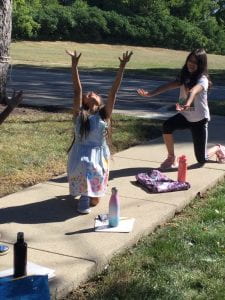 This Blog will be dedicated to 2nd-4th grades. Here, I will share pictures and give an overview about what we are doing in class. I am excited about the new year and all the ways the students and I will learn and grow together.
This Blog will be dedicated to 2nd-4th grades. Here, I will share pictures and give an overview about what we are doing in class. I am excited about the new year and all the ways the students and I will learn and grow together.
I hope to see you on Curriculum Night.
This will be a virtual event on Thursday, September 10. A ZOOM link will be made available.
Lights up! Behind the scenes
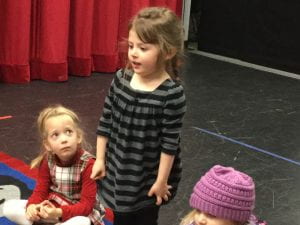 This blog focuses on Pre-school, Kindergarten and 1st grade
This blog focuses on Pre-school, Kindergarten and 1st grade
Just a note or 2:
Writing is a passion of mine, however the truth is I spend more time writing scenes and scripts for students to perform rather than writing about what takes place in the classroom. I hope this entry will give you a peek inside to see how the students are growing and SOARING in drama!
I have discovered a new way of uploading videos from the drama classroom. Just click on the underlined title!
Behind the scenes, in the drama classroom…
In Preschool – Otters and Lemurs
The students have been exploring their senses and stretching their imaginations. They are learning the value of warming up their bodies, and speaking with a clear and strong voice. More recently, we have been working on building our observation and memorization skills – while expressing different emotions or characters. The children love to discover and play, but their favorite time in class is often when we act out a story!
Watch the videos of the Otter Class acting out stories. Just click on!
Otters The Miller and his Donkey
Watch the videos of the Lemur Class acting out stories. Just click on!
Lemurs The Miller and his Donkey
Lemurs Imagine & Move Obstacle Course
In Kindergarten – Starfish and Sea Turtles
The students are learning how to work together. One way we do this is to march like a marching band. They love the challenge! This is a great way to exercise the “collaboration” muscle and prepare for their play THE GREAT RACE. The students are practicing how and where to move on stage; learning stage directions. This is not an easy process, as five and six year olds are still figuring out their right hand from their left. We are also training ourselves to memorize material quickly and express words with expression and projection.
Starfish Memorization & Projection
Starfish Rehearsal for The Great Race
Sea Turtles Working & Marching Together
Sea Turtles Rehearsal The Great Race
In 1st grade – Beluga Whales and Dolphins
By 1st grade, the students begin showing more confidence in their understanding of what is expected in the drama room. They begin to think more critically, they willingly share their imaginations, and desire to connect more realistically in their acting. Of course, there’s always time for silly moments. They are learning more physical control and how to use their bodies to express what they are saying.
Belugas Listening & Responding
Dolphins Listening & Responding
Don’t Forget to visit your child’s classroom for INFORMANCE DAYS – January 28,29, 31st!
Go to the Quest Weekly to sign-up
From moral lessons in Greek Mythology to the comedy of the Italian Renaissance
It was great to see parents at Meet the Teacher Night to learn about what we do in the drama classroom. I stress that PARTICIPATION is key to success, and we had some parents doing just that in an exercise called Stage Picture. I hope questions were answered in the time we enjoyed together. If for some reason you weren’t able to attend, here is a link – Lower School Drama Meet the Teacher
This blog focuses on 2nd grade, 3rd grade and 4th grade.
This year at Quest we are introducing Artificial Intelligence into the curriculum.
2nd grade Tigers and Elephants
 In the drama classroom, we presented the idea of ETHICS. We explored the moral questions often posed in a story or drama. As there are “ethical questions” relating to Artificial Intelligence, students were asked to discover and think about the moral lessons posed by Greek myths, so that they begin to build their own ethical sensibility.
In the drama classroom, we presented the idea of ETHICS. We explored the moral questions often posed in a story or drama. As there are “ethical questions” relating to Artificial Intelligence, students were asked to discover and think about the moral lessons posed by Greek myths, so that they begin to build their own ethical sensibility. 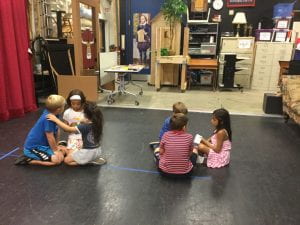
Today machines are programmed by people who may use what they are creating for good or bad. During drama class the students pondered the moral lesson in the story of King Midas and the Golden touch, then discussed how he used his new power given to him. They discussed questions like: What did King Midas do with his new power? Was his power used for good or bad? What were the consequences of his actions?
The students also discussed different choices they could make in every day situations, and the consequences of their actions – whether negative or positive. They especially like re-enacting another Greek myth – Pandora’s Box. Below are video clips from different classes throughout this unit. We will continue to explore the idea of ethics – moral rules that help direct a person’s behavior – as we bring to life Native American legends for the 2nd grade Potlatch coming up in November.
3rd grade – Treefrogs and Llamas AND 4th grade – Geckos and Foxes
Each year in both the 3rd and 4th grades, I acquaint the students with early forms of drama and live theatre. This year our focus has been on the Italian Renaissance, specifically the broad stock characters of the Commedia dell’ Arte. 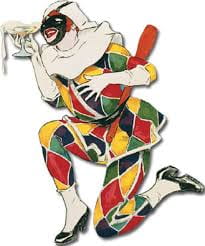 Developed to make people laugh, espcially the common folk, this stylized form of comedy was performed by a troupe of actors who traveled from town to town. The storylines or scenarios had a common theme that were mostly improvised.
Developed to make people laugh, espcially the common folk, this stylized form of comedy was performed by a troupe of actors who traveled from town to town. The storylines or scenarios had a common theme that were mostly improvised.
Descriptions for some of the characters from Commedia:
Dottore walks with his belly leading, knees bent, with a bouncy movement, taking small steps; he makes large gestures with his hands.
Pantalone is an educated  upperclass man who leads with his big nose, hunched over and flashing his expensive rings to all.
upperclass man who leads with his big nose, hunched over and flashing his expensive rings to all.
Capitano tries to make himself seen at all times. His feet and legs are far apart in order to make himself appear more mighty and strong. His chest sticks out, with his shoulders broad.
We looked at the various stock characters and discussed how this idea has influenced modern theatre and film today. 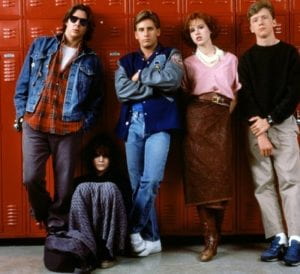 We created our own version of Modern Stock characters in short scenes. The students were encouraged to create exaggerated “stock” characters. We exploring – personality, movement and voice.
We created our own version of Modern Stock characters in short scenes. The students were encouraged to create exaggerated “stock” characters. We exploring – personality, movement and voice.
Drama is… serious business
We’ve had a busy start to the year! It was a great to see parents attending Meet the Teacher Night to learn about what we do in the drama classroom. I stress that PARTICIPATION is key to success, and we had some parents doing just that in an exercise called Stage Picture. I hope questions were answered in the time we enjoyed together. If you for some reason you weren’t able to attend, here is a link – Lower School Drama Meet the Teacher
This blog focuses on Pre-school, Kindergarten and 1st grade
Drama is… serious business 
I think students, even parents, may be somewhat surprised with all that we do in drama class. We’re not just learning lines and putting on plays. There is so much more to the craft of acting. Can you imagine an ice skater trying to qualify for the Olympics having only trained for a year? Absurd! Can you even conceive of an eye surgeon to be an expert in his field, but having never actually studied the human eye? Insane. Studying theatre arts is a discipline that also takes training over time. Specifically, acting is the study and communication of human behavior. Actors use their bodies and voices to communicate all kinds of human struggles and experiences. The actor’s instrument is made up of: the physical, the emotional, the imagination, sensory expression, logical thinking and more! In simple terms – the tools the actor needs to do drama are: The body. The voice. The mind (imagination). Each of these tools must be exercised and developed. Of course, this does not happen overnight, but is a life-long process of learning and discovery.
In the drama room at Quest we begin each class with a vocal and physical warm-up – fundamental to the actor’s 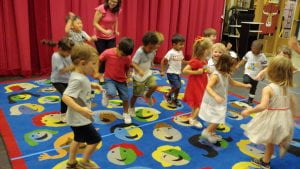 creative process. This helps the student transition from their prior thinking to the actor’s thought process. It also helps students to establish a pattern (of order) to the actor’s work. The warm-up often consists of a physical, a vocal, and a group component. The physical and vocal parts prepare the students to use their bodies as tools on the stage, while the group piece creates energy, directs focus, and serves as an ensemble builder.
creative process. This helps the student transition from their prior thinking to the actor’s thought process. It also helps students to establish a pattern (of order) to the actor’s work. The warm-up often consists of a physical, a vocal, and a group component. The physical and vocal parts prepare the students to use their bodies as tools on the stage, while the group piece creates energy, directs focus, and serves as an ensemble builder.
With our youngest students (Pre-school/Junior Kindergarten) we begin each year developing and stretching the imagination. In the study of acting we call this the MAGIC IF – pretending as is something is real. We’ve explored various way to use the imagination.
In Kindergarten and 1st grade not only are we exercising our imagination muscles, we always begin working on a vital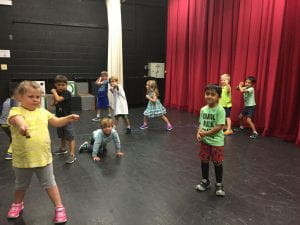 drama concept – GIVE AND TAKE. You cannot do the actor’s work without it. An actor knows when to give focus to another actor and when to take focus. If an actor is speaking, all eyes and ears should be on her. When it’s time to speak or move the action forward, the actor commits fully with strong energy and takes the focus. As we develop this skill, students learn readiness – ready to speak, ready to share an idea, students learn collaboration – the importance of everyone’s contribution.
drama concept – GIVE AND TAKE. You cannot do the actor’s work without it. An actor knows when to give focus to another actor and when to take focus. If an actor is speaking, all eyes and ears should be on her. When it’s time to speak or move the action forward, the actor commits fully with strong energy and takes the focus. As we develop this skill, students learn readiness – ready to speak, ready to share an idea, students learn collaboration – the importance of everyone’s contribution.
 The students are all at different levels and learning at their own pace. Some students think that drama class is a time to release a lot of energy, be silly and show off, BUT they will learn that their energy needs to be focused so that it produces clear and engaging action – that seems “as if it’s real.” You will hear me say… “It’s not time to be silly but SERIOUS.”
The students are all at different levels and learning at their own pace. Some students think that drama class is a time to release a lot of energy, be silly and show off, BUT they will learn that their energy needs to be focused so that it produces clear and engaging action – that seems “as if it’s real.” You will hear me say… “It’s not time to be silly but SERIOUS.”
Get Ready… We’re diving into another year (2019-2020) in drama!
Get ready! We’re diving into another year in
We’re diving into another year in 

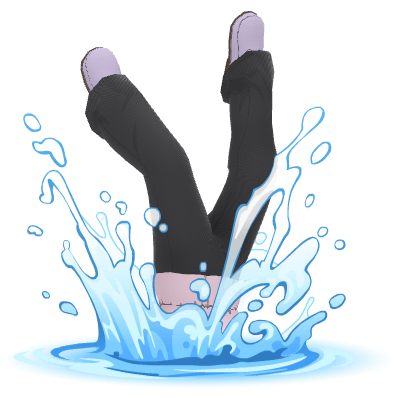

When students enter the drama room the expectation is that they will PARTICIPATE in all that we DO, DO, DO – as we discover, create, imagine, reveal and engage with others.
My hope is that each student will be eager to learn, and I will be able to create an environment that students will want to. Curiosity is a strong desire to learn or know something… Curiosity is awakened by unexpected information or experience that reveals gaps in one’s knowledge. Let’s be CURIOUS together!
As the Lower School Drama Teacher for students in PreSchool-4th grade, I love teaching young people, and I am passionate about teaching drama! My goal is to raise each child’s creative and expressive potential so that he or she engages in the art of theatre. This is my seventh year teaching drama at Quest, and it is a privilege to teach alongside such a committed and creative staff with some of the best kids on the planet!
Students have drama once a week for 45min/half an hour – depending upon the grade level. Lower School drama focuses on developing a basic understanding of the foundational skills in drama. Our focus is not just on the performance, but on the process it takes to get there. Kindergarten through 2nd grade will present a Drama and Music presentation together in March, and 3rd-4th grades will present one in May. (See specific dates below) This presentation partners with our Lower School Music Teacher, Mrs. Annabel Hasty. More details will come later in the school year.
Here, I will write about the happenings as they change and flow in Lower School Drama. Typically I rotate blog entries between Pre-School through 1st grade and then, grades 2nd-4th.
I am excited about the new year and all the ways the students and I will learn and grow together. I had a great summer with my family. Together we directed/performed three shows with a cast of talented students 16-21 years of age with the Schaumburg Street Theatre. Picture below: Me with the cast of Millie Monka and the Salmon Cannery.
Beautiful double rainbow after a performance this summer
With my siblings at my childhood home in Michigan.
Mrs. Armentrout (far right) hanging at school in 1981 with friends – she saw them this summer.
Mark Your Calendars…
Kindergarten, 1st & 2nd grade Musical: Wednesday, March 11, 2019 – 8:45am 3rd and 4th Drama and Music Presentation: Wednesday, May 6, 2019 – 6:30pm
See you at Lower School Meet the Teacher Night this Thursday, August 29th – 6:30-8pm
The best way to reach me is to email me at deanna.armentrout@questacademy.org
REHEARSE and REVEAL
This blog focuses on 1st grade, Kindergarten, and Preschool
re·hears·al (/rəˈhərsəl/) – a practice or trial performance of a play or other work for later public performance.
In the theatre, a rehearsal is used to assist performers in learning dialogue and to set blocking and stage movement. There are rules to the rehearsal process:
- Attendance. A rehearsal must have the active participation of all those in the scene/play. The absence of one person can waste the time of the other actors. If an emergency requires an absence, it’s the responsibility of the actor or crew member to notify the director ASAP. No one should leave a rehearsal until dismissed.
- Promptness. It is expected that everyone involved in the rehearsal or performance will be on time and ready to begin at the scheduled time. This is so important that all cast and crew members should hold this as a high value and reminder to others.
- Use of Time. Although there is a social aspect to participating in theatre, time should be used for preparing for the play, line study or other useful activities.
- Meeting Deadlines. When the cast is scheduled to be off-book (memorized), it is expected that each cast member will know his/her lines.
- Quiet. There is rarely any excuse for talking (or other noise) in the rehearsal space by those not involved in the scene. Any unnecessary noise negatively affects concentration and focus – distracting from the rehearsal process.
- Guests. Individuals not involved in the rehearsal should not attend unless it is arranged through the director. Students interested in observing a rehearsal as a learning experience, should receive permission from the director.
- Rehearsal Props and Performance Props. Rehearsal props and performance props are there for one reason only–to be used in rehearsal or performance by the actor to whom they are assigned. Props are often borrowed and/or irreplaceable and should not be used by anyone other than the designated actor.
- Prompting. When actors require assistance with a line in rehearsal, they should remain in character and say “line.” They should not show their frustration, since this could interfere with the performances of the other actors.
- Direction. It is not uncommon for fellow cast members or friends to offer advice about how an actor should play a role. Remember, only the director is responsible for the scene/play. Actor etiquette says: An actor should never direct another actor.
- Technical Rehearsal. This is often the longest rehearsal of the entire process, and it is often the most important. It is the first time that most of the technical elements are joined with production. Patience is required for all involved. Actors may be asked to wear rehearsal clothing similar to their costumes. Remember that the technical crew has only a few hours to perfect their part of the production while the cast has been working for weeks.
- Dress Rehearsals and Performances. These final rehearsals require the total concentration of the performers and crew, but new elements still may need to be integrated into the production.
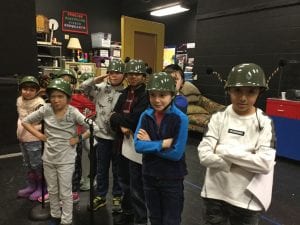 For young performers, rehearsal seems a long, tedious and sometimes confusing process. When I call “Places, let’s take it from the top, again.” I often hear some moans and groans. We need to RE-view and RE-peat – which is the purpose of a RE-HEAR-SAL. Each time we run a scene or the show, we “re-hear” what we are doing and make any adjustment to make the story clearer and better. This process takes time but it gives the student actors a kinesthetic connection to delivering their lines. It may seem easy to understand, but this is challenging to produce at a young age.
For young performers, rehearsal seems a long, tedious and sometimes confusing process. When I call “Places, let’s take it from the top, again.” I often hear some moans and groans. We need to RE-view and RE-peat – which is the purpose of a RE-HEAR-SAL. Each time we run a scene or the show, we “re-hear” what we are doing and make any adjustment to make the story clearer and better. This process takes time but it gives the student actors a kinesthetic connection to delivering their lines. It may seem easy to understand, but this is challenging to produce at a young age.
The Kindergarten SEA TURTLES and STARFISH and the 1st grade DOLPHINS and BELUGAS, (along with the 2nd grade Tigers) have been working hard rehearsing for their play. All students should be memorized at this point, but some students are still uncertain of their cues. In order for any good character work and vocal expression to be achieved, the actor must be freed up from the struggle of grasping for lines. One is not “acting” only saying lines – this is not fun. My hope is for each student to experience, not only a sense of accomplishment, but the thrill of bringing a character to life! The students should be reviewing and working on their lines at home for at least 10-15 minutes each evening before performance.
Rehearsal Process:
Our Preschool – Otters and Lemurs have been talking about “feelings and emotions.” Feelings are important and are a normal part of us. We all have them. In drama class, we show emotions or feelings when we tell and act out stories. With our younger students, we have been identifying different feelings and expressing them with our faces and bodies.
One lesson had the students looking at pictures that showed different emotions. Then, they recreate what they see and their classmates try to guess what emotion they are expressing. We think about what a person may be thinking or saying when we see that expression. We also explored how situations or circumstances cause people to have varying reactions.
A warm-up exercise called Use or Become: The students are given an imaginary object to “use or become.”
THE NIGHT OF KNIGHTS IS THIS SATURDAY
See you there!
Memorization, Monologues and More!
This blog focuses on 2nd, 3rd and 4th grades.
Why do actors work on monologues?
Monologues are a very important for actor training.
Monologues are a workout – physically, vocally and emotionally. Finding different monologues encourages the actor to read… read plays, and reading is part of the actor’s job! Learning a new monologue exposes the actor to different genres of plays, styles of writing and of course, the practice of memorization! Monologues are necessary for the audition process, and actors are told to have at least 3-4 in their tool box. You never know when you might need them. Having a performance ready monologue helps the actor prepare for anything and everything. A monologue provides the actor with the opportunity to showcase his/her work.
Prepare your monologue as if it is the most important thing you do as an actor. It will only help you.
The 3rd grade TREEFROGS and LLAMAS and the 4th grade LIONS and GECKOS have been presenting their monologues in class for one another.
Students are given points in the areas of vocal energy & physical movement and expression, characterization, focus, and memorization. They also receive points for previous exercises they’ve worked on in class including – character development, Character Interviews and the Moment Before. The Moment Before prepares for entering the stage in character. Asking questions like… “What just happened? Where is the character coming from? What is he/she feeling?” Below are some examples of student work in preparation.
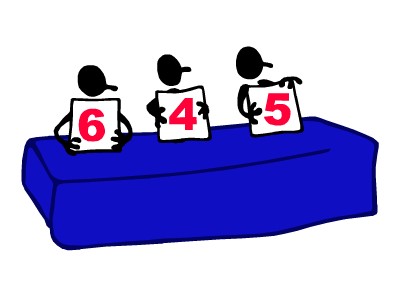 Students observing the monologue being presented must give feedback to their classmates – listening for projection, expression, looking for believable moments of connection and staying in character. It’s time for courage, self-discipline and vision to shine as each “actor” reveals a truthful character beyond just memorizing lines. My hope is that they step into the imaginary world they have created for their character, as if it were real. The monologues already presented have inspired and excited others to prepare for performance.
Students observing the monologue being presented must give feedback to their classmates – listening for projection, expression, looking for believable moments of connection and staying in character. It’s time for courage, self-discipline and vision to shine as each “actor” reveals a truthful character beyond just memorizing lines. My hope is that they step into the imaginary world they have created for their character, as if it were real. The monologues already presented have inspired and excited others to prepare for performance.
When monologues are complete, we will begin the work for our Drama and Music Presentation – TALL TALES FROM THE AMERICAN FRONTIER that will take place on Wednesday, May 8th at 6:30 pm. Mark your calendars now!
The Final Stretch for the 2nd grade TIGERS.
Time for endurance…
In less than a week the 2nd grade Tigers will be performing their play alongside the Kindergartners and 1st grade –BUGGED… they’re everywhere! The students are “off-book” and are investing focused energy in developing characters and telling a clear story. They are engaged in the process, doing their best to hit their cues, and are working on creating ensemble with their fellow classmates. Some students are eager to share their hard work; others are bit timid or have become weary in the rehearsal process. In this final stretch to performance, the students need to ENDURE. Sure, it’s more fun to play than to study lines, go over blocking or review song lyrics. But those who ENDURE are building the kind of character that will serve them in life. Endurance takes courage and discipline. Don’t quit now! Don’t forget to study those lines at home, even for ten minutes a day. It makes a difference! Remember to rehearse with articulation and projection.
THE NIGHT OF KNIGHTS IS THIS SATURDAY
See you there!
Process takes… time.
This blog focuses on Preschool-1st grade dram classes.
Did you miss INFORMANCE DAY in drama? 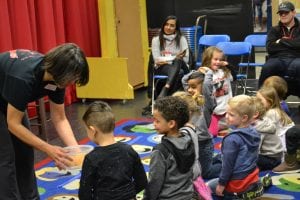
Below are words from Quest parents who shared thoughts about their experience and watching their child participate in class:
More confidence. Focused and serious. Paying attetion.
More observant and excited since last year.
The lesson engages the students.
Amazed in how drama includes so many areas of learning.
My child’s imagination has grown leaps and bounds!
I love how the students interact with one another.
The group work is so amazing.
It’s great how you get them to keep trying.
In our instant gratification culture… we can click a button and surprisingly, get some kind of response or answer. The actor’s process doesn’t work that way. Not only are there years of training and skill development, hours are spent on creating one character, developing one scene and even more hours rehearsing one play that you may only perform once! The artist in the theatre must learn to embrace and enjoy the PROCESS of getting to performance level because it takes energy, focus and a great deal of perseverance without complaint.
Pre-School & Junior Kindergarten OTTERS AND LEMURS have been learning about and exploring the Five Senses to help them use their imagination. The actor relies on sense memory to help create a truthful performance and learns to dive into the imaginary circumstances as if they were real. In our class we have smelled scents, tasted sweet and salty, listened to sounds, observed objects and touched temperatures and textures. We then imagine… a cold, blustery day, hanging out at the beach, smelling delicious cookies baking, tasting a sour lemon, hearing the wind howl and watching an ant crawl or a monster enter the room! The students are eager to participate and play – jumping right into the imaginary world of play. One class we put on imaginary shoes of all kinds and jumped, ran, danced and crept around.
1st graders BELUGAS AND DOLPHINS After reviewing stage directions, we have begun the process of blocking their play for BUGGED. A blocking rehearsal is deciding where and how the actors will move on stage. During this process, the goal is not on memorization or making a connection to what the character is doing or saying. The students often get restless waiting for their turn while the focus is on other characters. They are learning how to exercise their patience muscle.
Most people believe acting is about “being” the character. Well, there is some truth to that, however … acting is about DOING. It’s about…”action,” not emotion. Emotions come out of the actions and circumstances. A state of being is not actable because it provides nothing specific to do. It leaves the actor stuck with a general emotion. It leads him into stereotyped movements and gestures – clenching his fists to show he is angry, putting his hand to his forehead to show he is thoughtful, or contorting the muscles of his face to show he is in pain. Although I will ask the students to express emotions that are believable, our main focus is on action.
The 1st graders enjoy warming up to an exercise called “What are you doing?” It’s a tricky exercise that challenges the students mentally and physically. One student will start any kind of physical action. The other student will ask, “What are you doing?” The active student will respond “Feeding the dog.” Now… here’s the tricky part – The action the student is currently doing is not “feeding the dog.” It may be something completely different. However, the student who asks the question must begin… feeding the dog. This action moves back and forth between the two actors. There are rules they must abide by and if not follow – one can “get out.
The Kindergartens SEA TURTLES AND STARFISH have been practicing moving around the stage and responding to different Stage Directions. Eventually, this language will become second nature to them and they will respond intuitively. We are fine tuning the blocking for their play BUGGED, that will be performed on March 13 along with the 1st and 2nd graders.
These young students are learning to read, so the memorization process can be a bit more challenging. As they step up to the mic, most often they just say their lines. I have to remind them to be thinking like their character. We’ve been working on vocal expression and the use of GESTURE – using the body to clearly express a thought or idea. I will encourage them to bring their own ideas or enlist the help of their classmates. Acting is DOING. Acting is… Living truthfully under imaginary circumstances. My hope is that these young students will propel themselves into the imaginary world of the story, sharing it with excitement and intrigue.
 The Odyssey is this Thursday, February 7 from 6-8pm.
The Odyssey is this Thursday, February 7 from 6-8pm.
Come to be informed and inspired!
